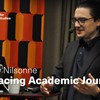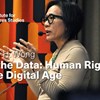tier
The intersection of class origin and immigration background in structuring social capital: the role of transnational ties
The British Journal of Sociology, vol 69, no 1, pp 99-123, doi: 10.1111/1468-4446.12289. Abstract The study investigates inequalities in access to social capital based on social class origin and immigra
Conference in honor of Professor Larry Temkin
Professor Larry Temkin, a prominent figure within moral philosophy, is retiring. His career was celebrated at a conference at Rutgers University by a number of notable speakers and participants. Our d

Gustav Nilsonne: Pathways to an Open Science System. Replacing Academic Journals
Open science enables cumulative knowledge and facilitates discovery. The transition to an open science system is underway, but important roadblocks remain. A decentralised, evolvable network of platfo
Gustav Nilsonne: Pathways to an open science system: Replacing academic journals
Venue: Institutet för framtidsstudier, Holländargatan 13, 4th floor, Stockholm, and onlineREGISTERResearch seminar with Gustav Nilsonne, Associate Professor of neuroscience. He is active in meta-sciencOpen science enables cumulative knowledge and facilitates discovery. The transition to an open science system is underway, but important roadblocks remain. A decentralised, evolvable network of platforms interconnected by open standards, and governed by the scientific community, is technically feasible. However, academic researchers remain tied to traditional journals not least because assessment of merit is tied to the venue of publication. Ways forward can include redirection of funding from legacy publishing models to new infrastructure and the development of new methods to assess scientific contributions. Concerted action by stakeholders needs to be combined with pluralistic experimentation on policies and interventions to further open science practices.
CANCELLED! Cécile Laborde: Is the Liberal State Secular?
Cécile Laborde, Professor of Political Theory FBA, Nuffield Chair of Political Theory.ABSTRACTIn this talk, I ask whether liberal legitimacy requires secularism – or separation between state and relig
Experiences matter: A longitudinal study of individual-level sources of declining social trust in the United States.
Social Science Research 95 Abstract The US has experienced a substantial decline in social trust in recent decades. Surprisingly few studies analyze whether individual-level explanations can account for
Wendy H. Wong: We, the Data: Human Rights in the Digital Age
Venue: Institutet för framtidsstudier, Holländargatan 13, 4th floor, Stockholm, or online. Research seminar with Wendy H. Wong, Professor of Political Science and Principal's Research Chair at the UniveThis talk will discuss some of the key themes from We, the Data: Human Rights in the Digital Age, which is a new book published by MIT Press. Human rights are one of the major political innovations of the 20th century. Their emergence after World War II and global uptake promised a new world in which human autonomy, community, dignity, and equality could be protected. Datafication, however, poses some unique challenges for our human rights framework because they are “sticky” and ubiquitous in emerging technologies such as artificial intelligence (AI). The talk focuses on five takeaways from the book that ties AI and data to human rights.

Wendy H. Wong: We, the Data - Human Rights in the Digital Age
Research seminar with Wendy H. Wong, Professor of Political Science and Principal's Research Chair at the University of British Columbia. In this talk Wendy H. Wong discusses some of the key themes fr

Klaus Georg Hansen: Greenland – 300 years of colonisation
Since the formal colonisation of Greenland in 1721 by the Norwegian-Danish missionary Hans Egede Greenland has experienced five 'constitutional' breaks. Thus, seven distinct colonial eras can be ident
Implications of climate change for policing practice worldwide
Venue: Institute for Futures Studies, Holländargatan 13 in Stockholm, or online Welcome to a seminar arranged in collaboration with two visiting researchers from the Hague University of Applied Science,








